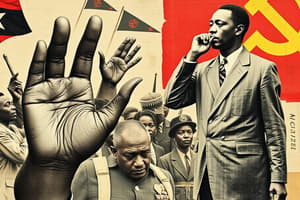Podcast
Questions and Answers
What distinguishes the epoch of the bourgeoisie relative to prior eras?
What distinguishes the epoch of the bourgeoisie relative to prior eras?
The epoch of the bourgeoisie has simplified class antagonisms, splitting society into two great classes: Bourgeoisie and Proletariat.
What links does Marx make between the development of Modern Industry and the bourgeoisie?
What links does Marx make between the development of Modern Industry and the bourgeoisie?
Modern Industry established the world market, which advanced commerce, navigation, and communication, leading to the development and political advancement of the bourgeoisie.
What revolutionary role has the bourgeoisie played in society?
What revolutionary role has the bourgeoisie played in society?
It has ended feudal relations, diminished family ties to monetary relationships, and reduced personal worth to exchange value.
What weapons did the bourgeoisie supply to the proletariat?
What weapons did the bourgeoisie supply to the proletariat?
How does the proletariat expand according to Marx?
How does the proletariat expand according to Marx?
Why does Marx believe the proletariat is the real revolutionary class?
Why does Marx believe the proletariat is the real revolutionary class?
How does Weber define 'power'?
How does Weber define 'power'?
What constitutes a 'class' according to Weber?
What constitutes a 'class' according to Weber?
Why are classes not necessarily communities?
Why are classes not necessarily communities?
What are 'status groups' and how do they differ from classes?
What are 'status groups' and how do they differ from classes?
How does a caste system differ from ethnic segregation?
How does a caste system differ from ethnic segregation?
How are classes, status groups, and parties differently stratified?
How are classes, status groups, and parties differently stratified?
Flashcards are hidden until you start studying
Study Notes
The Epoch of the Bourgeoisie
- The bourgeoisie era simplifies class antagonisms, creating two primary opposing classes: Bourgeoisie and Proletariat.
- Characterized by constant revolution of production, ongoing social unrest, and persistent uncertainty, setting it apart from previous historical epochs.
Development of Modern Industry
- Establishment of the world market leads to vast improvements in commerce, navigation, and communication.
- As these sectors expand, bourgeoisie capital grows, displacing medieval classes.
- Political advancements of the bourgeoisie accompany its economic growth, culminating in dominance within modern representative states.
Revolutionary Role of the Bourgeoisie
- Ended feudal, patriarchal ties and replaced them with individual self-interest.
- Dismantled traditional occupations, reducing them to mere wage-labor roles.
- Subverted family relationships into monetary transactions, emphasizing economic over emotional bonds.
Bourgeoisie’s Own Destruction
- The bourgeoisie unwittingly provides the proletariat with the means of political and educational empowerment, setting the stage for its own downfall.
Stages of Proletariat Development
- Initial struggles occur at the individual level, escalating to factory and trade-wide contests against direct bourgeois exploitation.
- Proletariat initially targets remnants of monarchy and non-industrial bourgeoisie rather than the primary bourgeoisie.
- Key victories lead to the unification of workers, bolstered by advances in communication technology.
Proletariat as the Revolutionary Class
- Proletariat represents the self-aware movement of the majority, unlike other classes that seek to preserve their middle-class status.
- Other classes act conservatively to defend their interests rather than promoting revolutionary change.
- Real societal change cannot occur without the upheaval of established social structures by the proletariat.
Weber’s Definition of Power
- Power is defined as the ability to realize one's will, even against resistance in communal action.
- Identified three sources of power: Economic, Social, and Legal, which interact within a community's power dynamics.
Class and Class-Situation
- Classes consist of individuals sharing a common economic interest, but do not form a community in the true sense.
- Class-situation is determined by shared economic life chances, influenced by market conditions and opportunities for income.
Classes vs. Communities
- Classes do not constitute communities; they represent potential bases for communal actions driven by economic circumstances.
- Misidentifying classes as communities leads to misunderstanding historical events.
Understanding Status Groups
- Status groups are communities with shared social honor but differ from economic classes which are based solely on material interests.
- The social status is defined by a collective honor that influences personal interactions.
Differences between Caste and Ethnic Segregation
- Caste systems feature a rigid vertical structure of hierarchy, while ethnic segregation allows for horizontal coexistence.
- Caste systems create recognized social subordination and acknowledge differentiated honor within societal roles.
Stratification of Classes, Status Groups, and Parties
- Classes correspond to economic roles in the production and distribution of goods.
- Status groups are stratified by consumption and lifestyle preferences.
- Parties emerge within a broader societal context, often transcending political boundaries to collaborate on shared objectives.
Studying That Suits You
Use AI to generate personalized quizzes and flashcards to suit your learning preferences.




